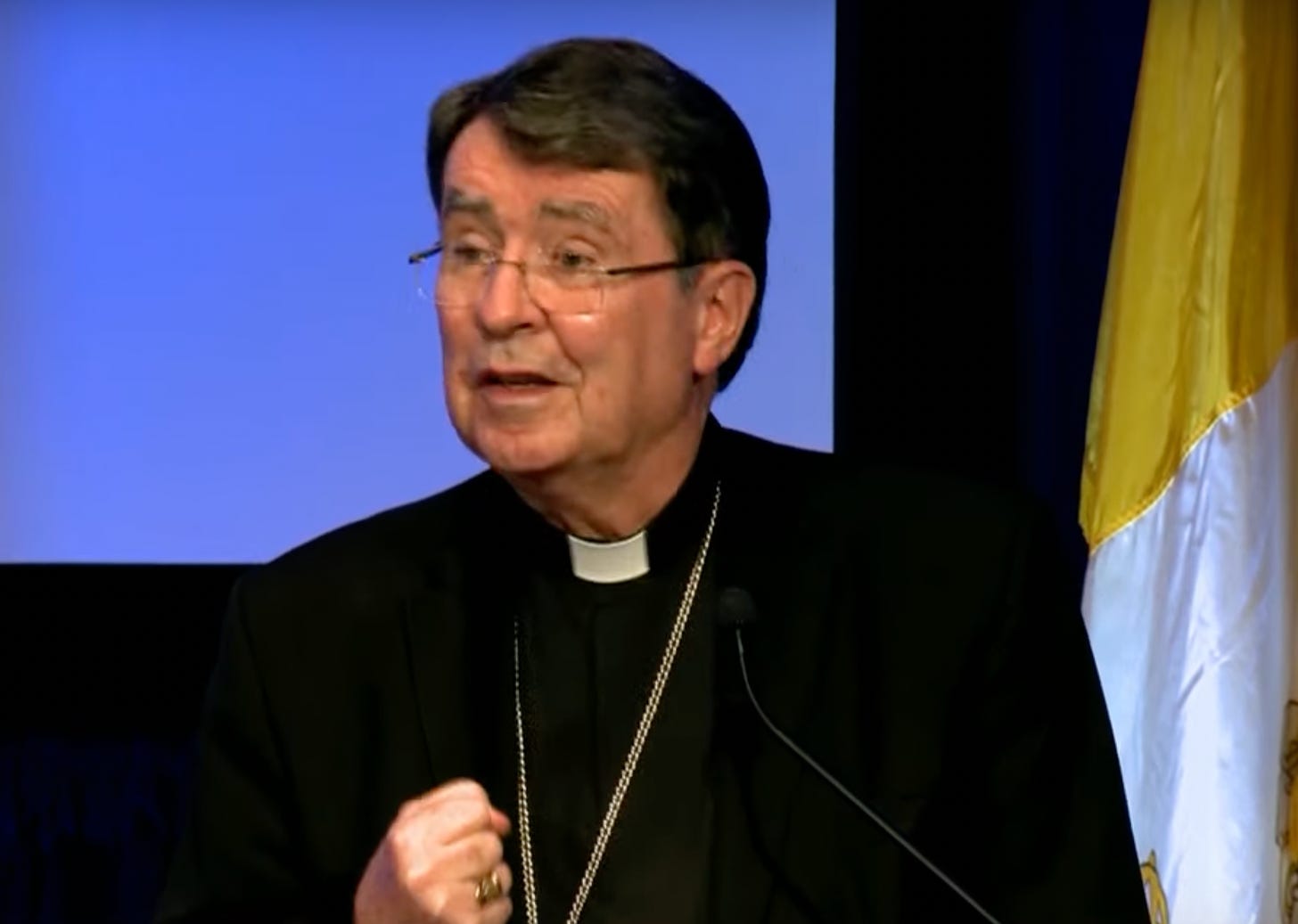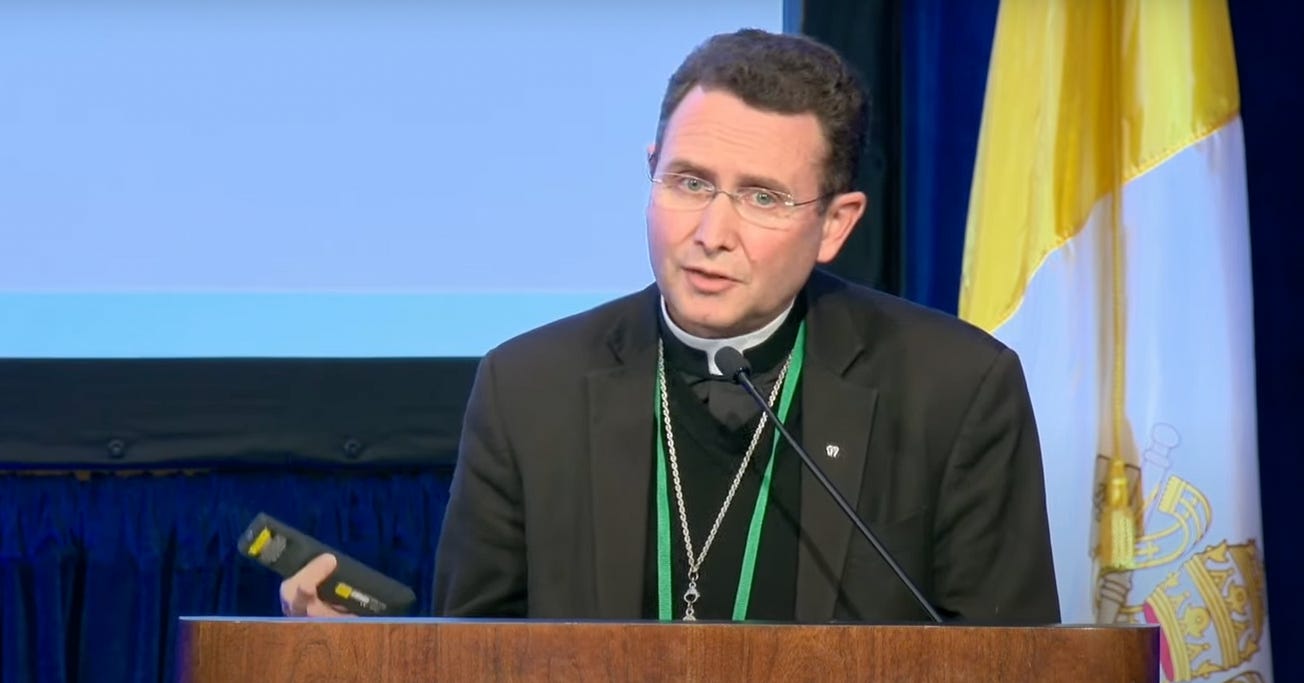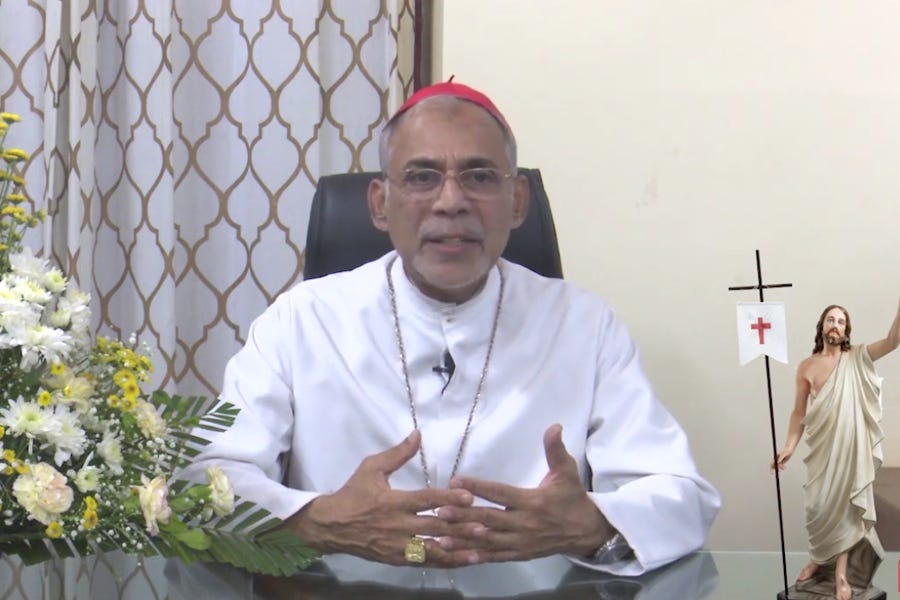The apostolic nuncio to the United States talked about synodality Tuesday, telling the U.S. bishops’ conference that synod on it is not just “a meeting about meetings,” but a model for evangelization.
But while Archbishop Christophe Pierre’s speech will be closely scrutinized for hints of implied criticism or tension with the USCCB leadership, it is can also be seen as complementary to a set of remarks from conference president Archbishop Jose Gomez, describing a coherent vision for the Church in the U.S. which is both synodal and missionary.
In fact, given the common themes that emerged in the Tuesday speeches of Pierre and Gomez, it would not be altogether impossible to argue reasonably that the nuncio was, by intention, aiming to give Gomez a boost.
And those possibilities point to the problem with media meta-narratives in Catholic journalism: They offer more often a Rosarch test of their authors than any meaningful insight into the subjects they cover.
Case in point: A narrative has sharpened among some Catholic commentators in recent months which pits the leadership of the U.S. bishops’ conference in stark opposition to the magisterium and curia of Pope Francis.
After the speeches today, commentators looking to advance that narrative will likely set Pierre’s text and his topic next to the address of conference president Archbishop Jose Gomez, who discussed on Monday the Church’s mission to evangelize a secularized American society.
And at least some of those commentators will likely argue that the nuncio and Gomez articulated different, conflicting visions for the Church in the U.S.
But taken on their own merits, and without trying to read ecclesiastical politics into their words, both speeches delivered Tuesday morning can also be seen as mutually reinforcing approaches to a challenging topic: the mission and ministry of the Church in a world of accelerated secularization after the onset of the pandemic.
Gomez came into the USCCB meeting this week amid criticism from some quarters for a speech he gave earlier this month, in which he noted that in the face of real and urgent demands for justice, many new movements had developed pseudo-religious trappings.
“Whatever we call these movements they claim to offer what religion provides,” Gomez said in that speech, but none is able to deliver on its promises of justice and salvation. “We need to proclaim Jesus Christ. Boldly, creatively,” Gomez said at the time.
Speaking to his brother bishops on Tuesday morning, the archbishop elaborated on that point, saying that American society is “losing its story” through the process of secularization. But, the archbishop insisted, there is a growing hunger for the Gospel after years of political and social strife and the coronavirus pandemic.
Gomez has come under fire for supposedly playing politics by speaking out against secularism and the consequences of political polarization, but the same phenomena were also flagged by Pierre in his own speech to the bishops. In fact,the bishop quoted the pope’s homily from the World Day of the Poor, in which he said we are “part of a history marked by tribulation, violence, suffering and injustice, ever awaiting a liberation that never seems to arrive.
“I believe that synodality is an answer to the challenges of our time,” Pierre said, “and to the confrontation which is threatening to divide this country and which also has its echoes in the Church.”
The nuncio’s presentation on synodality offered a definition which reached outside of the sometimes self-referential and obscure language which has plagued discussion of the subject. Instead, he offered a simple premise: that the dialogue of the synodal process did not presuppose any compromise of either truth or authentic teaching authority, but could be a vital means of evangelization.
Synodality, Pierre said, is a way in which the Church can better live its mission to evangelize at every level, and, through the internal process of living the synod, become better prepared to engage with the world.
Key to understanding synodality, Pierre said, is accepting that dialogue did not of its nature admit the need for the acceptance of problematic voices, but rather understanding them.
“Not every opinion is equal, and it is not as if truth were determined by majority vote,” Pierre said, but respectful listening is essential to moving a person closer to Christ and to the Church’s teaching.
Pierre referenced the recent debate over Communion for pro-abortion politicians, and warned against a mentality which would see the denial of Communion as a kind of end in itself, instead of understanding why a politician had departed from Church teaching as part of a constant pastoral dialogue aimed at bringing them back.
The nuncio proposed that the same process of synodal listening in which the Church needed to engage internally, is also an essential part of evangelizing.
Taking abortion as an example, Pierre said that while the Church is and must remain “unapologetically pro-life” and absolute in its opposition to abortion, a synodal approach includes understanding what drives mothers to seek to end a pregnancy, and meeting the practical, emotional and spiritual needs of expectant mothers.
In order for the Church to speak to cultural wounds of racism, poverty and injustice, Pierre argued, it had to develop the habit of listening first, because the Church cannot evangelize effectively without understanding the reality of those to whom she is speaking. Clear teaching is essential, the nuncio said, but “a Church that would teach must be first the Church that listens.”
“Synodality is mission driven,” Pierre said, and his pitch, far from running contrary to Gomez’s own plan for the Church’s role in a secularized society, appears to be an effective roadmap for closer engagement with the hot-button socio-political topics the USCCB president has taken to weighing in on.
For all the media-crafted “tensions” between the two men’s priorities, both Gomez and Pierre told the U.S. bishops Tuesday that the Church has an urgent need to evangelize a society in search of justice and meaning. Both were clear that the message of the Gospel was the only authentic answer to the wounds carried by those on the margins of that society.
While certainly distinct in tone, neither speech appeared at odds with the other. Perhaps it’s just synodality at work.





